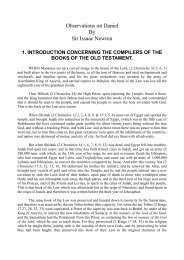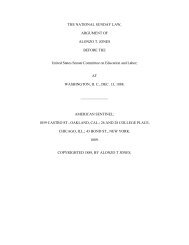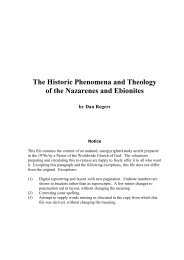Legends of the Shawangunk2 JR.pdf - Friends of the Sabbath ...
Legends of the Shawangunk2 JR.pdf - Friends of the Sabbath ...
Legends of the Shawangunk2 JR.pdf - Friends of the Sabbath ...
You also want an ePaper? Increase the reach of your titles
YUMPU automatically turns print PDFs into web optimized ePapers that Google loves.
8 <strong>Legends</strong> <strong>of</strong> <strong>the</strong> Shawangunk<br />
ceremonies with great earnestness and solemnity, by way <strong>of</strong> propitiation <strong>of</strong> his wrath.<br />
Among <strong>the</strong>m <strong>the</strong> dance was universal; but it was not for purposes <strong>of</strong> pastime, as<br />
among civilized nations. It had a deeper signification. It was a solemn ceremony, and<br />
was an outward expression <strong>of</strong> <strong>the</strong>ir sentiments <strong>of</strong> religion and war.<br />
It is <strong>the</strong> logic <strong>of</strong> events that <strong>the</strong> red man yields to <strong>the</strong> conquering foot <strong>of</strong> <strong>the</strong> Saxon.<br />
The weaker race has wi<strong>the</strong>red from <strong>the</strong> presence <strong>of</strong> <strong>the</strong> stronger. “By <strong>the</strong> majestic rivers<br />
and in <strong>the</strong> depths <strong>of</strong> <strong>the</strong> solitary wood, <strong>the</strong> feeble son <strong>of</strong> <strong>the</strong> ‘bow and arrow’ will be seen<br />
no more; <strong>the</strong> cypress and hemlock sing his requiem.”<br />
The Delawares related a legend to <strong>the</strong> effect that many centuries ago <strong>the</strong>ir ancestors<br />
dwelt far in <strong>the</strong> western wilds. Emigrating eastwardly, after many years, <strong>the</strong>y arrived on<br />
<strong>the</strong> Namœsi Sipu (Mississippi), where <strong>the</strong>y encountered <strong>the</strong> Mengwe (Iroquois), who had<br />
also come from a distant country. The spies <strong>of</strong> <strong>the</strong> Delawares reported that <strong>the</strong> country<br />
on <strong>the</strong> east <strong>of</strong> <strong>the</strong> river was inhabited by a powerful nation, dwelling in large towns<br />
erected upon <strong>the</strong> principal rivers.<br />
This people were said to be tall and robust, warlike, and <strong>of</strong> gigantic mould. They bore<br />
<strong>the</strong> name <strong>of</strong> Alligewi (Alleghany); <strong>the</strong>ir towns were defended by regular fortifications;<br />
many vestiges <strong>of</strong> which are yet apparent. The Delawares, requesting to establish<br />
<strong>the</strong>mselves on <strong>the</strong>ir territory, were refused; but obtained leave to pass <strong>the</strong> river that <strong>the</strong>y<br />
might seek a habitation far<strong>the</strong>r to <strong>the</strong> eastward. The Alligewi, alarmed at <strong>the</strong>ir numbers,<br />
violated <strong>the</strong>ir word and destroyed many <strong>of</strong> <strong>the</strong> Delawares who had reached <strong>the</strong> eastern<br />
shore, and threatened a like fate to <strong>the</strong> remainder, should <strong>the</strong>y attempt <strong>the</strong> passage.<br />
Roused at this act <strong>of</strong> treachery, <strong>the</strong> Delawares eagerly accepted a proposition from <strong>the</strong><br />
Mengwe, who had hi<strong>the</strong>rto been spectators <strong>of</strong> <strong>the</strong> occurrence, to unite with <strong>the</strong>m for <strong>the</strong><br />
conquest <strong>of</strong> <strong>the</strong> country.<br />
A war <strong>of</strong> extermination was <strong>the</strong>n commenced, which eventuated in <strong>the</strong> expulsion <strong>of</strong><br />
<strong>the</strong> Alligewi, who fled from <strong>the</strong>ir ancient seats never to return. The devastated country<br />
was apportioned among <strong>the</strong> conquerors, <strong>the</strong> Mengwe choosing <strong>the</strong> neighborhood <strong>of</strong> <strong>the</strong><br />
lakes, and <strong>the</strong> Delawares appropriating <strong>the</strong> territory fur<strong>the</strong>r to <strong>the</strong> south.<br />
For many years <strong>the</strong> conquerors lived toge<strong>the</strong>r in much harmony. Some Delaware<br />
hunters, having penetrated far into <strong>the</strong> forest, discovered <strong>the</strong> great rivers, <strong>the</strong><br />
Susquehanna and Delaware; and crossing <strong>the</strong> Skeyickby (New Jersey) country, came at<br />
last to <strong>the</strong> Mahicannittuck (Hudson river). Upon <strong>the</strong>ir return to <strong>the</strong>ir nation, <strong>the</strong>y<br />
described <strong>the</strong> country <strong>the</strong>y had visited as abounding in game, fish, fowl and fruits, but<br />
destitute <strong>of</strong> inhabitants. Summoning toge<strong>the</strong>r <strong>the</strong>ir chiefs and principal men, after solemn<br />
and protracted deliberation it was concluded that this was <strong>the</strong> home destined for <strong>the</strong>m by<br />
<strong>the</strong> Great Spirit; and thi<strong>the</strong>r <strong>the</strong> tribe went and took up <strong>the</strong>ir abode, making <strong>the</strong> Delaware<br />
river, to which <strong>the</strong>y gave <strong>the</strong> name <strong>of</strong> Lenapewihittuck, <strong>the</strong> centre <strong>of</strong> <strong>the</strong>ir possessions.
















